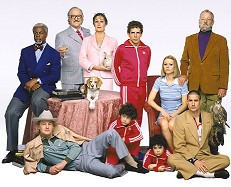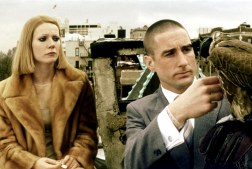| The Royal Tenenbaums |
| |
 |
UK/USA/Germany, 2001. Rated R. 137 minutes.
Cast:
Gene Hackman, Gwyneth Paltrow, Ben Stiller, Anjelica Huston, Luke Wilson,
Owen Wilson, Danny Glover, Bill Murray, Alec Baldwin (voice), Seymour
Cassel, Kumar Pallana
Writers: Wes Anderson, Owen Wilson
Music: Mark Mothersbaugh
Cinematographer: Robert D. Yeoman
Producers: Wes Anderson, Barry Mendel, Scott Rudin
Director: Wes Anderson
LINKS
|
Note: This review contains minor spoilers.
 f
you did a web search on the word "precocious," chances are your screen would
fill up with a hundred or so reviews of The Royal Tenenbaums. It seems
that's the first word that comes to mind when critics describe Wes Anderson's
follow-up to his cult classic Rushmore.
"Precocious" isn't an insulting word, though you'd think it was from the way
it's being used in these reviews. It alternately describes both the film's director,
who is thirty-one and has three feature films under his belt, and the film itself,
which plays like a children's book for adults. The positive connotation of the
word is that Anderson is a gifted director with a distinct, fully formed style
whose films are emotionally rich and mature. The negative intimation, which
is the one critics have been using the word for, is that Anderson is showing
off, like Mozart playing piano backwards in front of Salieri. In this sense,
Anderson's film is seen as twee and self-infatuated. I would like to restore
the positive suggestions of precocity because they say more about the film than
the audience.
f
you did a web search on the word "precocious," chances are your screen would
fill up with a hundred or so reviews of The Royal Tenenbaums. It seems
that's the first word that comes to mind when critics describe Wes Anderson's
follow-up to his cult classic Rushmore.
"Precocious" isn't an insulting word, though you'd think it was from the way
it's being used in these reviews. It alternately describes both the film's director,
who is thirty-one and has three feature films under his belt, and the film itself,
which plays like a children's book for adults. The positive connotation of the
word is that Anderson is a gifted director with a distinct, fully formed style
whose films are emotionally rich and mature. The negative intimation, which
is the one critics have been using the word for, is that Anderson is showing
off, like Mozart playing piano backwards in front of Salieri. In this sense,
Anderson's film is seen as twee and self-infatuated. I would like to restore
the positive suggestions of precocity because they say more about the film than
the audience.
The Royal Tenenbaums is populated with adults who are still precocious
children, and it's the film's nature to duplicate that sense of arrested preternatural
development. As in Rushmore, costuming is a key way in which characters'
personalities are expressed. Both films keep their characters in the same outfits
throughout most of the film, lending a cartoon-like quality of personal and
emotional stasis; these characters are suspended in time like insects trapped
in liquid amber. Their suspension is the result of a childhood that was spirited
away from them and an upbringing devoid of attention to their needs. "I had
a crummy childhood too, but I don't wear the same Adidas sweat suit 365 days
a year!" you might complain. But the costumes aren't meant to be taken literally;
they're an external expression of inward pain. Chas (Ben Stiller) wears those
sweat suits because it shows a man who's in a constant state of high-energy
panic, conditioned to distrust everyone and to take advantage of them before
they do so to him.
AboutFilm.Com
The Big Picture
|
| Alison |
B+
|
| Carlo |
C+
|
| Claudia |
-
|
| Dana |
B
|
| Jeff |
B+
|
| ratings explained |
When the family patriarch, Royal Tenenbaum (Gene Hackman) abandoned his brood
twenty years before, the family seemingly remained in stasis, waiting for him
to come back and bring them up to date. Royal's wife, Etheline (Anjelica Huston)
never bothered to divorce him. His adopted daughter Margot (Gwyneth Paltrow),
and his son Richie (Luke Wilson) have flamed out and never found happiness in
their work or their love lives. The film's setting is purposely vague in defining
a year for its action. We are to assume it's the present day, but artifacts
from the past occupy so much screen space that it becomes clear how inescapable
the past is for the Tenenbaums. (Precisely illustrated in the cramped quarters
of the closet where Royal and Chas argue amongst boxes and boxes of vintage
board games.) However imperfect their intact family was, its shadow is strangling
the latter-day detritus of its dissolution, and Royal endeavors to restore his
family that never was to a happiness it never had. The film's emotional pull
comes from the gradual change of Royal's motives, which were at first selfish
(financial), but later spring from a genuine desire for his family's well being.
Again, this echoes Rushmore's Max, whose interest evolves from captivating
Miss Cross to finding happiness for his friends.
Unfortunately, The Royal Tenenbaums does not have the same resonance
as Rushmore. Perhaps because Rushmore was new and unprecedented (Anderson's
first film, Bottle Rocket, only hinted at the riches of Rushmore)
I was more impressed with it. The Royal Tenenbaums arrives burdened with
expectations and holds fewer surprises. The pieces are all there for an exceptional
film, but they never gel into an organic whole (this is probably the most disappointing
film I've given a B+). The melancholic undercurrent often feels out of synch
with the film's playfulness, whereas in Rushmore it was seamless. Rather
than actually feeling moved, I noticed where I was supposed to be feeling moved.
It may be that a second viewing will change that. I find I relax more when I've
seen a picture once and can let it work on me without obstruction. Indeed, Rushmore
gets better with each repeated viewing, deepening in emotion and revealing its
complexity of construction.
Aside from the film's emotional transparency, The Royal Tenenbaums works
very well. Anderson's compositions provide excellent jokes as well as definitive
snapshots of his characters. One shot of Margot, isolated in the frame from
her family, a diminished figure in the far corner of the frame, tells you all
you need to know about her role in the family. There is always something interesting
going on in the frame, whether it's the highly detailed production design or
a background character who nearly upstages the foreground action. Anderson subtly
imparts biographical information with deft visual detail: when Margot shares
a rooftop cigarette with Richie, she reveals a pack of smokes that have been
in their hiding place for over a decade, underlining a lifetime of isolated
retreats to the windblown rooftop. Many shots in the film look like illustrations
from a children's book, which is appropriate given that the movie is read like
one in a jaunty voiceover by Alec Baldwin.
The cast performs solidly, though only Gwyneth Paltrow and Gene Hackman are
exceptional. Hackman has the benefit of a better-written part; he's the least
caricatured and most likely to inhabit reality (the film has its own reality,
which is fine, but it's nice to have an anchor into our own world like Hackman's
character). Gwyneth Paltrow does a lot with her minimalist character; she makes
an art out of glum neglect. Ben Stiller is good for laughs, as usual, but when
he's given the film's big scene of emotional reconciliation it falls flat. It's
only partially his fault, as the screenplay doesn't pave the way for him very
well. Luke Wilson, as well, suffers from inhabiting a character who's meant
to project more pathos than he can produce, but he still provides a nice portrait
of the film's most generous and warm person. His brother Owen, who is also the
co-writer and executive producer, is shoehorned into the film as a character
who wishes he were adopted by the Tenenbaums. He's meant to be funnier
than he actually is, though, and his zaniness comes across as trying too hard.
The real comic scene-stealer is Kumar Pallana, who plays Royal's sidekick Pagoda.
Mostly silent, he produces one of the film's best displays of underlying emotion
when he stabs Royal after the latter admits he's been using his sickness as
a charade.
It's not very helpful for a critic to say that a movie is one that either you
get or you don't get, but sometimes that's the most accurate way to explain
the divergence of opinion. If you don't get The Royal Tenenbaums, you
will find it precocious; a studiously eccentric exercise in whimsy that never
fails to remind you how well read (J.D. Salinger, The Magnificent Ambersons,
"From the Mixed-Up Files of Mrs. Basil E. Frankweiler") its author is. If you
do get The Royal Tenenbaums, you will recognize it as precocious; a mature
work teeming with creativity that conveys a canny understanding of the pull
of family. A film that inspires such agreement doesn't come along very often.
Review
© January 2002 by AboutFilm.Com and the author.
Images © 2001 Touchstone Pictures. All Rights Reserved.


